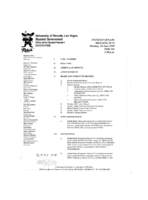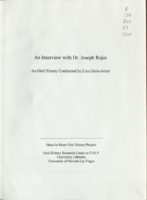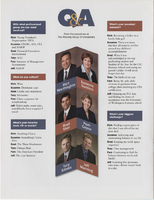Search the Special Collections and Archives Portal
Search Results
C. Vern Olmstead Professional Papers
Identifier
Abstract
The C. Vern Olmstead Professional Papers (1940-1975) contain materials related to Olmstead’s work as a prominent meat industry executive. The collection pertains to the preparation, cutting, storage, marketing, and distribution of meats including beef, pork, and poultry. Materials include reports, correspondence, newspaper and magazine clippings, photographic prints and slides, and publications regarding topics relevant to the handling and sale of meat in the United States and Canada.
Archival Collection
Boardwalk Hotel and Casino Records
Identifier
Abstract
The Boardwalk Hotel and Casino Records date from 1993 to 2005 and contain administrative files, gaming projects and systems files, promotional photographs, advertisements, and audiovisual materials pertaining to the Boardwalk Hotel and Casino. The collection also contains material for the Boardwalk under its various names, including the Boardwalk Hotel and Casino, Viscount Hotel, and Holiday Inn Casino Boardwalk.
Archival Collection
Syphus-Bunker Papers
Identifier
Abstract
The Syphus-Bunker Papers date from 1891 to 1994, with the majority of the collection consisting of correspondence between Mary Etta Syphus and John Mathieson Bunker from 1891 to 1895. The collection also contains correspondence from friends and relatives, and documentation related to Mary Etta Syphus' attendance at Brigham Young Academy Church Normal Training School. Other materials include family history information and two color photographs of family homes. The collection also includes typed transcripts of the correspondence.
Archival Collection

Meeting minutes for Consolidated Student Senate University of Nevada, Las Vegas, June 28, 1999
Date
Archival Collection
Description
Text
John Vellardita (Clark County Education Association) oral history interview conducted by Magdalena Martinez: transcript
Date
Archival Collection
Description
From the Lincy Institute "Perspectives from the COVID-19 Pandemic" Oral History Project (MS-01178) -- Education sector interviews file.
Text

Transcript of interview with Dr. Joseph Rojas by Lisa Gioia-Acres, September 30, 2008
Date
Archival Collection
Description
Dr. Joseph Rojas, born 1933 in Alexandria, Louisiana, was the son of Joseph Edward Rojas and wife Carroll. He graduated high school at age 16 and entered Loyola University of the South. Two years later he was accepted at Louisiana State University School of Medicine, graduating with a medical degree in 1957. He interned at Charity Hospital and then completed his OB-GYN residency at Tulane University. Several mentors worked with Dr. Rojas during his residency and he recalls learning surgical and bed-side skills from the likes of Dr. Lynn White and Dr. Fred Janson. He also remembers the very high volume of patients - up to 300 - that he and other residents saw daily. Dr. Rojas married Mona Robicheaux, RN, during his residency and afterwards joined the Air Force. He and his family — they eventually had six children — were stationed at Nellis Air Force Base, arriving in Las Vegas in 1961. He was chief of OBGYN and deputy hospital commander while at Nellis and then served as chief of OBGYN at Southern Nevada Memorial Hospital until 1972. He later served as chief of staff at Women's Hospital and Valley Hospital, and was the first chief of staff at Summerlin Hospital. Dr. Rojas also maintained a private practice outside of the hospital. His wife worked alongside him in his office, and they share memories and anecdotes of the patients they saw and the general atmosphere of the medical community. Both Joseph and Mona agree that Las Vegas hospitals were less racially segregated than the hospitals in Louisiana, and felt that the West was more open to integration. In 1966 Dr. Rojas started the first OB-GYN residency in Nevada, which led to the development of the University of Nevada School of Medicine. He was a researcher, lecturer, teacher, and author. He earned many awards, including the Harold Feikes MD Award for Outstanding Physician in Clark County (2001), and the Nevada State Medical Association Distinguished Physician Award (1980). Dr. Rojas passed away in May of 2009, leaving behind an incredible legacy of service to the residents of Clark County.
Text

Miguel Villarba oral history interview: transcript
Date
Archival Collection
Description
Oral history interview with Miguel Villarba conducted by David Islas on December 6, 2021 for Reflections: The Las Vegas Asian American and Pacific Islander Oral History Project. In this interview, Miguel Villarba shares his family's history growing up in Manila, Philippines and immigrating to the United States in 2016. He talks about first living in Chattanooga, Tennessee before moving to Las Vegas, Nevada to be near family when Miguel was in high school. Miguel Villarba shares stories of his grandfather's farm in Pangasinan, Philippines, the differences in city and town life across Manila, Chattanooga, and Las Vegas, and his educational plans. He also talks about Filipino culture and traditions, and racial discrimination.
Text



